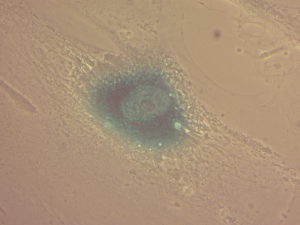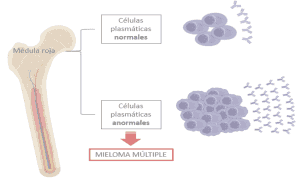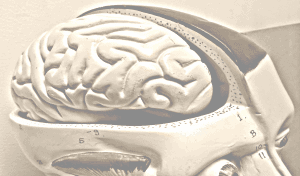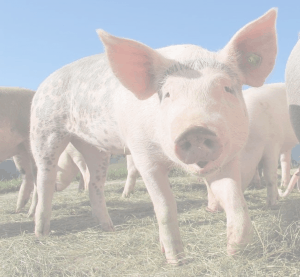It is Life´s law. But, why do we age? What is ageing? Aging is a heterogeneous, complex and multifactorial process, not everyone ages in the same way or at the same speed; some people age faster than others. This is partially due to our genetic heritage (we cannot do anything about it), but also to our lifestyle (our diet, stress, physical activity, where we live…).
Throughout life, we gradually accumulate in our body a special type of cells called senescent. They look like normal cells; however, they are neither as agile nor as effective. They are tired cells that work more slowly and have special characteristics. It is believed that their accumulation is closely linked to the age-related diseases, such as dementia, cancer or cardiovascular diseases. Therefore, these cells are used as a model to study what happens when we get old.

Senescent cell stained in blue
Senescent cells are special, and, among other things, they regulate their genes differently than young cells, due to defects in a process called “splicing”. Splicing is a type of alternative edition, a kind of “cut and paste”, by which the cell can generate different proteins from the same message.
Imagine DNA as a cookbook, in which there are basic instructions (genes) to cook different dishes (proteins). However, when we start cooking, we can adapt these recipes thanks to this editing process, doing them in a slightly different way, to adjust to the diverse situations of daily life. For example, we have the recipe for paella, but today our brother (who is vegan) comes to eat, so we modify the recipe slightly and we cook paella only with vegetables. The following day we don’t have seafood, because we forgot to buy it, so we will cook paella only with meat. Thus, with the same recipe, we are able to adapt to the daily circumstances, and fulfil our goal of eating paella.
The same thing happens to the cell, the DNA gives the recipe and the splicing modifies the recipe conveniently to generate different versions of the same protein. This process is crucial throughout our lives and makes us successfully overcome different situations. However, as we get older, the cells lose the ability to adapt recipes and the alternative editing process is reduced. Under any circumstance, the cell will only be able to cook the standard paella, which will cause problems. If this happens in only one cell, nothing dramatic happens. But if our body has 60-80% of senescent cells unable to adapt to the challenges of life, then, we begin to have difficulties.
If we don’t know how to regulate our glucose levels, we will develop diabetes mellitus; if we don’t know how to degrade proteins, we could develop Alzheimer’s or Parkinson’s diseases; if we cannot regulate our blood pressure, we will develop cardiovascular risk. This is what happens when we get older, we lose the ability to adapt and, little by little, we fail in the daily challenges, so that the age-related diseases appear.
However, not all are bad news. Recently we have seen how we can modulate the alternative edition artificially, returning to the senescent cell its capacity to face the daily challenges as a young cell does. In our laboratory, we are discovering the role played by the factors that regulate this alternative editing process in ageing and how modulating these factors, we can influence on the speed at which we age.
The investigation of aging is booming not only to create anti-aging therapies that will allow us to be young much longer, but we are discovering what happens as we age. This is opening the door to new potential treatments for diseases associated with ageing such as Alzheimer’s or diabetes, which are responsible for a large part of health spending, the reduction of quality of life and increased dependence on our elders.
By Dr Eva Latorre Duque. Postdoctoral Researcher at the Institute of Biomedical and Clinical Sciences, University of Exeter. SRUK Southwest Constituency.






